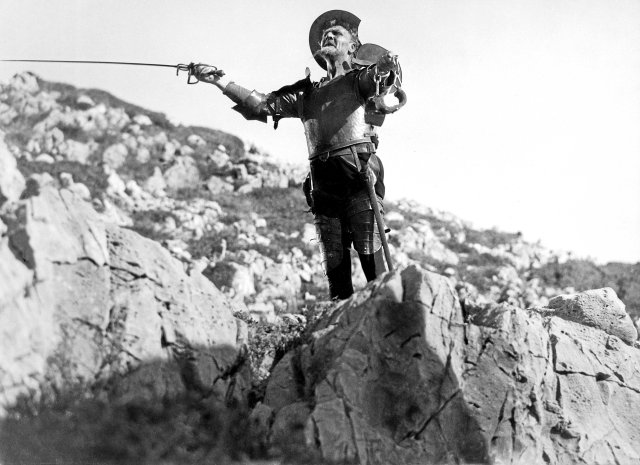FW Pabst was an ambitious man with many problems: still from his film “Cervantes,” which he shot in France in 1933.
Photo: imago/KHARBINE-TAPABOR
Film is a fleeting industry. Only present on screen for a short time, most films are quickly forgotten. The film reels from the early days of cinema were often lost and only fragmentary reports from newspapers and books remained of their contents. Even for a director like Wim Wenders, it was difficult to find copies of his early films for a retrospective in the Berlin cinema “Babylon” in the mid-1990s. The situation has now improved with digitalization and the establishment of foundations by individual directors to ensure the preservation of their work. But who still knows the director Georg Wilhelm Pabst today? He was the one who discovered Greta Garbo and made her a global star.
Daniel Kehlmann wants to change that with “Lichtspiel”. In the novel’s framework, Franz Wilzek, a fictitious, now very old, former cameraman of the Austrian director who died in 1967, lives in a Viennese retirement home. He is the last living person who worked with Pabst on his film “The Molander Case” in 1944/45. The film was lost in the chaos of war and no one has ever seen it. When Wilzek, already slightly confused because of his old age, is invited to a talk show as a contemporary witness, a scandal occurs in front of the camera: he claims that the film was never made. At the same time, the reader learns that Wilzek can no longer let go of the images of the hundreds of concentration camp prisoners who were forced to act as listeners in a replica concert hall.
It is the ambivalence that interests Daniel Kehlmann in G. W. Pabst. Not only was he a brilliant director – just not as famous as Fritz Lang, Billy Wilder and Ernst Lubitsch, who all emigrated – but he was also not a Nazi. Before fascism, he had made socially critical films such as “The Joyless Alley” or “Western Front 1918”, an anti-war film that made him a communist in the eyes of the Nazis. On the other hand, he made three films in Nazi Germany between 1939 and 1945. It wasn’t propaganda like Veit Harlan’s “Jud Süß” or Leni Riefenstahl’s party conference films; But because of their hidden glorification of self-sacrifice, some film historians consider them to be more effective as perseverance and war propaganda than Harlan’s openly anti-Semitic propaganda strip.
Kehlmann therefore concentrates on the 30s and 40s in »Lichtspiel«. It shows Pabst in France, then in Hollywood, where he arrived in 1934. There too he is considered a brilliant director, but he fails because he could not adapt to the studio system like Lang, Lubitsch or Zinnemann, apart from the fact that he barely spoke English. As a result, he was able to make the film “A Modern Hero,” but was forced to accept both the bad script and the mediocre actors. The film was a flop and in Hollywood that meant no more orders.
In an interview, Kehlmann said that there is little source material about G. W. Pabst. But that was exactly what appealed to him because it meant he could invent a lot for his novel. Kehlmann is not interested in a biography that can be verified in every detail. »Lichtspiel« tells more generally about a director who is tossed back and forth between the ambition to make good films – which was and is not easy because of the high financial outlay (and therefore risk) – and the rejection of fascism.
When Pabst returns to Europe, he is unlucky. After several films in France, he suffered a complicated bone fracture while visiting his sick mother in Austria in the summer of 1939. Shortly afterwards, Hitler’s Germany invaded Poland and a return to France was no longer possible. An attempt to return to the USA via Rome fails. Pabst stays in Austria with his family. And, personally initiated by Goebbels, he receives the tempting offer to make films that no one will talk him into, with the best actors and large financial resources.
“Lichtspiel” is an excitingly written novel. All characters are convincingly drawn in their contradictions. The social, political and professional constraints of the film business are told in a differentiated way by Kehlmann. However, the book is more for fans of the large top view. The inner struggles of the characters play a minor role. The novel also consists of a lot of dialogue, in many sections almost like a screenplay.
However, the large overview narrative gives the impression in some places that something is only mentioned for the sake of completeness. The scene in which Pabst sits among refugees in a French café seems like a name-dropping of exile. Kehlmann characterizes everyone with a few sentences, which, given the extensively known biographies of those described, seems abbreviated, like a drawer into which they are shoved.
Perhaps it would have been wiser to write a novel with a fictional character, without the restriction of a historical biography. A novel in which no prominent exiles appear briefly by name, purely functionally as sidekicks. Perhaps there should have been less action and more focus on the artist’s inner struggles. Because something is always happening in “Lichtspiel”. But that would have been a different novel.
Daniel Kehlmann: Light play. Rowohlt, 480 p., hardcover, €26.
Become a member of the nd.Genossenschaft!

Since January 1, 2022, the »nd« will be published as an independent left-wing newspaper owned by the staff and readers. Be there and support media diversity and visible left-wing positions as a cooperative member. Fill out the membership form now.
More information on www.dasnd.de/genossenschaft
link sbobet judi bola online sbobet judi bola
